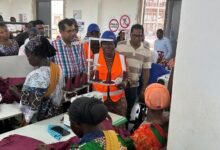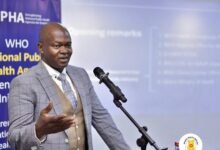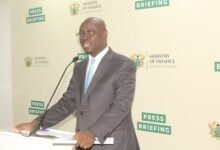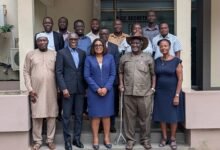NDPC launches Ghana at 100 strategic framework
The National Development Planning Commission (NDPC), on Tuesday, launched the Ghana at 100 strategic framework in Accra designed to propel the country into social and economic transformation,
The framework seeks to guide the country into becoming a prosperous nation with a guaranteed high income per capita of not less than US$50,000 equivalent by 2057 when the Ghana celebrates its Centenary anniversary.
The framework is founded on four key pillars, namely, Economic, Social, Environment, and Governance, Peace and Security, with 10 drivers which will serve as catalyst to accelerate the achievement of national development goals.
The framework was developed based on the 2016 NDPC draft 40-year Long-Term National Development Plan and the 2019 Ghana Beyond Aid Charter, drawing from the visions of the ‘Better Ghana Agenda’ and the ‘Ghana Beyond Aid’ scheme.
The Chairman of NDPC, Professor Emeritus Stephen Adei, speaking at the launch of the document at the 13th National Development Forum, underscored the essence of having a national long term development plan beyond party manifestoes.
He said, without a national development plan, the country would end up in a vicious cycle of not achieving the desired transformation, and said the country had the potential to generate the financial resources to achieve its development goals.
“Ghana, even from our own resources, we can generate about $100 billion to support our development,” saying, “We must raise our tax revenues from 13.5 per cent of GDP (Gross Domestic Product) to about 20 per cent minimum.”
He also said, there was the need for leakages and illicit financial flows to be dealt with, while value-for-money on contracts be done, in addition to Public- Private- Partnership (PPP) arrangements to drive domestic and external investors and other sources of revenue to implement national development plans.
In the forward of the abridged version of the 460 page document, President Nana Addo Dankwa Akufo-Addo, indicated that the document would inform the “new direction to establish a strong economy that creates opportunities, inspires people to start businesses, and stimulates expansion of existing businesses.”
He added that this would “Ultimately, lead to the creation of jobs, increased economic growth and higher incomes.”
Meanwhile, experts have made profound statements that it was critical for political parties to draw their manifestoes from a national development plan, indicating that often, the manifestoes were short-lived, and could not yield desired development in the country.
The Director of the Institute of Statistical, Social and Economic Research (ISSER), Prof. Peter Quartey said it was not sustainable for the country to develop as expected, dwelling on manifestoes.
He explained that when political parties aligned their manifestoes to national development plan, it would lead to continuity and address the various socio-economic challenges bedeviling the country.
Similarly, Senior Lecturer at the Department of Political Science at the University of Ghana, Prof. Joseph Atsu Ayee, called on political parties to ensure that they were guided by national development plans.
Adding to this, the Chairperson of Strengthening Transparency, Accountability and Responsiveness (STAR-Ghana) Foundation, Dr Esther Ofei-Aboagye, asked political parties to develop their philosophies and align them with national development plans in a way that would lead to the exploitation of resources in the best ways possible.





